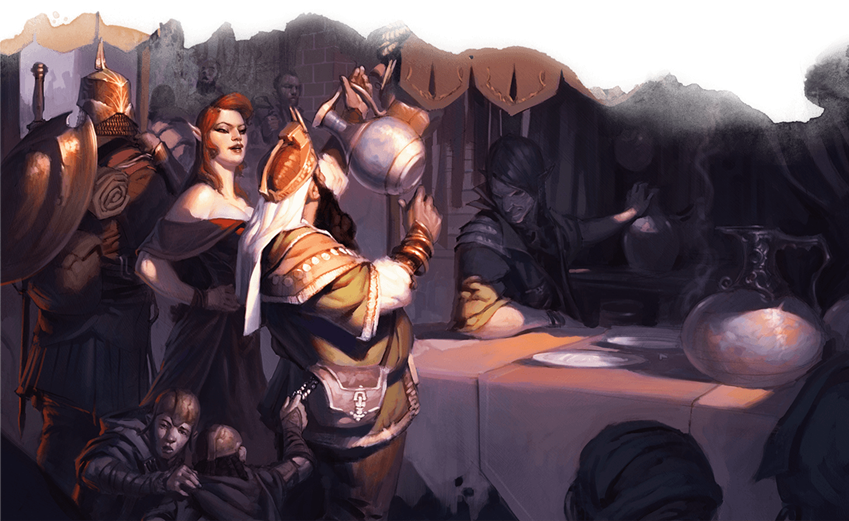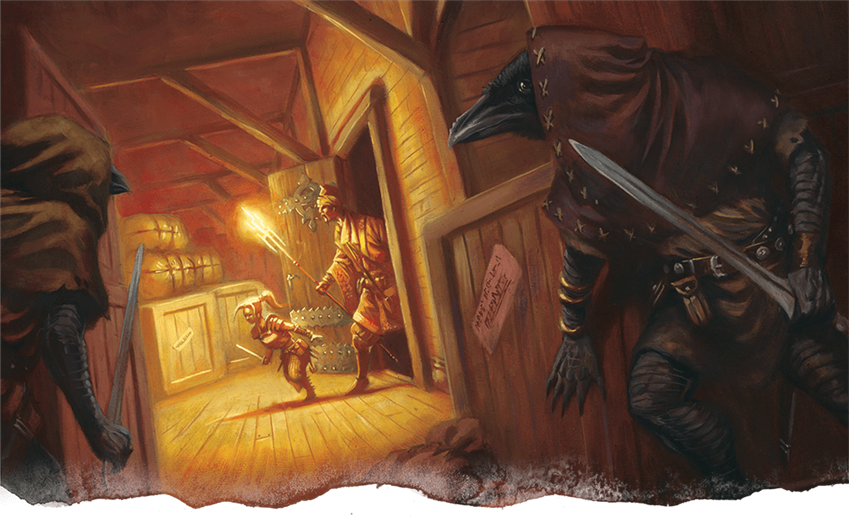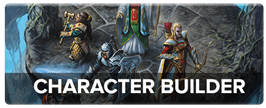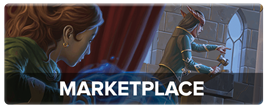House rules can make your D&D games more epic. If your game features lots of ability checks, and your characters use their skill and tool proficiencies all over the place, this new Talented Checks house rule can speed up your game, make your characters feel more like competent heroes, and make it easier to run mystery and social intrigue adventures. Let’s talk about Talented Checks!

Talented Checks
This house rule is short and sweet. Let’s start by stating it plainly here, and then we’ll dive into the nuances, interactions, and side effects this rule has as it echoes throughout the rest of the D&D rules. Here’s the house rule in its entirety:
If you’re proficient with a skill or tool, you automatically succeed on ability checks using that proficiency if the DC of that check is equal to or lower than 10 + your modifiers that apply to that check.
This is a fairly simple house rule, but it can have a massive impact on how your D&D game runs. It’s well-suited to social intrigue or mystery stories (like Waterdeep: Dragon Heist or adventures like The Styes in Ghosts of Saltmarsh), or any other adventure in which characters are expected to make a lot of checks.
This house rule even has uses in dungeon-crawling tales like Waterdeep: Dungeon of the Mad Mage, since it makes each class’s identity in the dungeon even more distinct. If a fighter has proficiency in Athletics, giving them the ability to automatically succeed on easy Strength (Athletics) checks lets their player feel like a competent action hero—which is the core of their class. Likewise, rogues can confidently pick locks that aren’t too beyond their skill, and wizards can comfortably succeed at Intelligence (Arcana) checks to decipher magical secrets, making them feel like all that studying they did in Candlekeep was worth something in the long run.

Passive Checks vs. Talented Checks
Most D&D players are at least passingly familiar with passive checks—particularly the most common type of passive check, a passive Wisdom (Perception) check. Your passive Wisdom (Perception) score is listed on your character sheet, and that value is equal to 10 + all modifiers that normally apply to the check, such as your Wisdom modifier and your proficiency bonus (if you’re proficient in the Perception skill).
Talented checks use the same formula as passive checks for determining success and failure, but they work differently. Here are some distinctions to keep in mind if you’re using this house rule.
Passive checks are always on; talented checks aren’t. When you enter a room in a dungeon, you automatically succeed at any Wisdom (Perception) checks that have a DC equal to or lower than your passive Wisdom (Perception) score. Even though a talented check can automatically succeed, you still need to actively choose to make an ability check.
You need to be proficient to make a talented check. Anyone can make a passive check. For instance, you still have a passive Wisdom (Perception) score even if you aren’t proficient in the Perception skill. Your passive score in that case is equal to 10 + your Wisdom modifier. Talented checks, however, can only be made by people who are proficient with the skill or tool being used. This helps protect the usefulness of characters that have invested resources into mastering a certain type of skill or tool.
Not all checks are passive checks, but any check can be talented. The rules of D&D aren’t clear on what checks can or can’t be passive. By the rules, any combination of ability scores and proficiencies can be made “passive,” but the only ones that are called out specifically by the rules are passive Wisdom (Perception) and passive Intelligence (Investigation)—the latter only shows up in the [feat]Observant[/feat] in the Player’s Handbook. That’s why those two passive scores are the only ones that appear on the D&D Beyond Character Sheet. If you want to make any other skill passive, you need to talk with your players (or ask your DM) and make it clear that’s what’s happening.
That’s not the case with talented checks. If you use this house rule, you’re making a clear statement to your players that if you’re proficient with a skill or tool, you can simply choose to succeed on easy checks using those proficiencies.

What about Reliable Talent?
Reliable Talent is a rogue class feature that allows you to “treat a d20 roll of 9 or lower as a 10” whenever you “make an ability check that lets you add your proficiency bonus.” This house rule is essentially expanding Reliable Talent to all characters, but with less dice rolling. This is only a problem if your game reaches 11th level and you have a rogue in your party; they’ll need to receive another mechanical bonus to replace the one that this house rule has essentially given to everyone.
A fine replacement for Reliable Talent is the bard’s Jack of All Trades class feature, which allows you to add half your proficiency bonus to any check that you wouldn’t otherwise add your proficiency bonus to. Even though its function is different, replacing Reliable Talent with Jack of All Trades as the rogue’s 11th-level class feature fulfils a similar role of improving their odds of success when making ability checks.
What about Temporary Proficiency?
Some class features, like the Knowledge Domain cleric’s Channel Divinity: Knowledge of the Ages feature, temporarily grants you proficiency with a skill or tool. Given a strict reading of the rules, this house rule allows you to make a talented check as long as you are proficient with a skill or tool; there’s no stipulation that you must always be proficient, just that you must be proficient when you make the check. This house rule certainly makes Knowledge Domain clerics better, but I don’t think it makes them particularly overpowered.
As with any house rule, it’s incumbent upon you and your table to work with your players and Dungeon Master to modify the rules to suit your needs.

What about Xanathar’s Guide to Everything?
Xanathar’s Guide to Everything gives Dungeon Masters and players a great deal of specific guidance on how to use tool proficiencies in fun and useful ways. Some of the fun of using these tool proficiencies relies on the tension of the dice; will you succeed at forging a signature with your calligrapher’s tools, even with its high DC? This house rule doesn’t make it more likely for characters to succeed at incredibly hard checks, but it does make it a guarantee that they’ll succeed at the easier checks, since they have to be proficient with a particular tool in order to attempt some of these specialized checks in the first place. I don’t think that this causes any problems, unless you really enjoy the uncertainty involved in possibly failing easy checks.
Xanathar’s also gives guidance on making downtime activities exciting. Some of these downtime activities involve making ability checks to determine how well you succeed at a certain activity. For instance, committing crimes while in town requires you to choose a DC, and then make several checks against that DC. If your characters just want a little bit of easy cash, it could become boring if they choose a DC that they can automatically beat using a talented check. Removing the risk of failure could make checks like this rote and mundane.
On the other hand, it’s up to you to decide if this is a bad thing or not. Your party may have a little more gold than usual, but what’s wrong with that? If one of your character is a master thief who just wants a reliable cash flow, let them live out the fantasy of pulling off a string of flawless low-profile capers week after week. But you’ve seen enough heist movies to know they’ll eventually want more, right? Thieves in movies, plays, and TV shows have massive egos and poor impulse control; they’re always looking for something bigger, badder, and shinier.
If this house rule causes crime (or whatever your players’ go-to downtime activity is) to become routine, try upping the ante yourself. Drop hints about the “Grand Diamond of Cormyr” being put on display in the Waterdeep Metropolitan Museum for a tenday only in one month’s time. This isn’t just a standard crime; this is a crime with DCs of 30 across the board. The characters are going to need to do a lot of legwork to rig these checks in their favor, and talented checks won’t help them here.
Do you have any questions about this house rule? How would you use it in your D&D games? And do you have any house rules of your own? Let us know in the comments!
Special thanks to @ThinkingDM for his thread about passive skills, which inspired me to revise and expand my original draft of this house rule.
Create A Brand-New Adventurer Acquire New Powers and Adventures Browse All Your D&D Content
 James Haeck is the lead writer for D&D Beyond, the co-author of Waterdeep: Dragon Heist, Baldur's Gate: Descent into Avernus, and the Critical Role Explorer's Guide to Wildemount, a member of the Guild Adepts, and a freelance writer for Wizards of the Coast, the D&D Adventurers League, and other RPG companies. He lives in Seattle, Washington with his fiancée Hannah and their animal companions Mei and Marzipan. You can find him wasting time on Twitter at @jamesjhaeck.
James Haeck is the lead writer for D&D Beyond, the co-author of Waterdeep: Dragon Heist, Baldur's Gate: Descent into Avernus, and the Critical Role Explorer's Guide to Wildemount, a member of the Guild Adepts, and a freelance writer for Wizards of the Coast, the D&D Adventurers League, and other RPG companies. He lives in Seattle, Washington with his fiancée Hannah and their animal companions Mei and Marzipan. You can find him wasting time on Twitter at @jamesjhaeck.











-
View User Profile
-
Send Message
Posted Aug 27, 2020I think I would prefer a DM who is more liberal with giving advantage. Still lets the player roll (which is part of the fun!) and gives a chance of failure, but a much higher chance of success. If you already have like a +6 on a skill, with advantage, chances are your total will meet a low DC anyway, and it lets it be more situational. Bad rolls are part of the fun, but I agree that it sucks when your character who's an expert liar rolls a nat 1 deception on a random NPC, and I think giving advantage when the stakes are low and the character should be good at it is more than fair.
-
View User Profile
-
Send Message
Posted Aug 27, 2020Yes, it is. If an NPC is lying or hiding something, you could have it roll against a PC's passive insight and telling the PC whether or not they feel something might be off about what they're saying/doing.
If the passive insight fails, but the player then asks to do an insight check to see whether there is more to it than the eye can see, I'd use the same roll I used against the passive insight, for consistency. That's how I use passive insight as a DM anyway.
-
View User Profile
-
Send Message
Posted Aug 27, 2020But that's my whole point. The above talented check system just gives you a guideline that if you spent your proficiency and expertise and maybe even feats in a skill, what could be considered as you definitely know.
A person investing in survival would definitely know twenty ways to tie a rope an average person never even heard of. A history buff would definitely know about events in the neighborhood country an average farmer wouldn't even care about.
-
View User Profile
-
Send Message
Posted Aug 27, 2020werewolf related homebrew horrors would be pretty epic james. And also this is a great article
-
View User Profile
-
Send Message
Posted Aug 27, 2020Yes, I know this is based on taking 10 and 20 from past editions. But that’s in situations where you aren’t under pressure and/or have plenty of time. I feel like just adding the take 10/20 rules would be good, not having to have proficiency.
-
View User Profile
-
Send Message
Posted Aug 27, 2020I really like this idea, and I think I will add it to my game.
-
View User Profile
-
Send Message
Posted Aug 28, 2020What if someone multiclassed 11 levels rogue and 2 levels bard? They would have reliable talent which is replaced by jack of all trades which they already have.
-
View User Profile
-
Send Message
Posted Aug 28, 2020This needs to be an official rule. I always thought it was weird that a Wizard with +8 in arcana, for example, might fail a DC 18 check to glean information from an ancient arcane text, while a dumb barbarian with +0 could get lucky and roll a 20 and laugh at the silly wizard who couldn't understand the book. Sometimes in my game, I just say, "You've studied similar texts, so you know that this book refers to... yada yada yada." If the barbarian says, "I want to make a check," I would just say, "You've never run across anything like this in your life. It's gibberish to you."
-
View User Profile
-
Send Message
Posted Aug 28, 2020Sounds like they would have to "suffer" the same fate as the Extra Attack of a level 6 Valor or Swords bard if they multiclass 5 levels into Fighter, Ranger or Barbarian...
-
View User Profile
-
Send Message
Posted Aug 28, 2020That wasn't your point at all, your "point" was to attack my preference for critical failures by hurling out ridiculous examples for checks that your DM shouldn't be asking you to make in the first place; you don't need this "talented checks" system to bypass that, you need a DM that doesn't ask you to make checks for ridiculous things, which is a problem I suspect 99% of players don't suffer from to begin with.
These are more silly examples!
A person investing survival might know a bunch of different ways to tie a rope, but a survival check isn't about whether they know how to tie a rope, it's whether they do it in a way that's going to succeed. It has nothing to do with personal ability, as a character could tie the rope wrong, or choose the wrong spot to place a trap, a creature might bypass it etc.
A history buff might absolutely know more than a farmer about history, but that doesn't mean they know something specific that the farmer might know instead. Being knowledgeable about history doesn't mean you know all history; a farmer is much more likely to know local folklore than a city educated scholar.
Every single example you're giving is missing the entire point of what a skill and a check are for, while very blatantly ignoring that there is already a mechanism for not having to take checks; it's called not being asked to to take a check, you use it all the time when your character stands up, goes through a door, walks forward, etc. etc.
I do not want to keep going around in circles on this; I've made my points as simply as I possibly can, if you want to continue not listening to them you go right ahead.
-
View User Profile
-
Send Message
Posted Aug 28, 2020Great article, as always James. Looks like a very fun idea and I'm excited to try it out in my campaign.
-
View User Profile
-
Send Message
Posted Aug 28, 2020I like it, but I would do an 8 + skill + proficiency bonus.
-
View User Profile
-
Send Message
Posted Aug 28, 2020Dice make D and D combat epic. Natral 20s and natral 1s speeding up the battle or ruining it is what makes it so great. Also this epic house rule is basicly the same thing as the optimal rule for mechanics, the rule of averages.
-
View User Profile
-
Send Message
Posted Aug 28, 2020It's not just succeeding on a DC 10 though. That'd be succeeding on anything equal to 10 + your modifier for the skill. So for a 5th level bard with expertise that could easily be a DC 20 check automatically succeeds. Add a few levels there and that bard could be automatically succeeding on DC 25 checks.
-
View User Profile
-
Send Message
Posted Aug 28, 2020I like the idea but if you're getting an automatic success I might go with a DC of 5 + your skill modifier. That way you get out of the DC 10 checks but not the DC 15 which is medium difficulty, at least without a very specialized ability. I typically apply this by just not having certain people roll certain checks for something that'd be trivial especially once they get above level 10. The rogue with expertise doesn't have to roll for picking a DC 13 lock etc. It's just too easy and a do you roll a nat 1 check at a certain point.
-
View User Profile
-
Send Message
Posted Aug 28, 2020It's a decent idea at a glance, but no matter how good you are at something you can always still screw up from time to time. I don't like the idea of "automatic success." It defeats the purpose of the dice and removes consequence.
-
View User Profile
-
Send Message
Posted Aug 29, 2020I think I'm going to adapt this to my home game. Personally, I don't think there's ever a situation where a raging barbarian with a +7 Athletics should fail to kick in a door. Some checks really should just work.
-
View User Profile
-
Send Message
Posted Aug 29, 2020I use a variant of this for intelligence checks (arcana, history, nature, religion). Basically, if a PC is trained in the skill I give them any relevant additional information, no check required.
-
View User Profile
-
Send Message
Posted Aug 29, 2020this will be a no from me.
removes the chance to mess up in something, and that can happen even to the best, and also it is like given all the 11th rouge ability Reliable Talents in all they are proficient in.
something can get on your mind so you are distracted or something like that.
also we got passive insight, the passive is supposed to be something you do all the time without thinking, so Perception, Investigation and Insight, so basically seeing the small things without actively looking for it.
-
View User Profile
-
Send Message
Posted Aug 29, 2020Regarding a criminal using reliable talent to carry out a string of no-threat low-level jobs in a town; this could lead to an increase in awareness among the targets and law enforcement. Either the DC of crimes could steadily increase, week after week; or else the victims might call in bounty hunters to find the criminal menace.